Editor:
Brandon Sweet
University Communications
bulletin@uwaterloo.ca
Beyond the 2022 Advisor Conference

A message from Academic Advising Community of Practice.
The 2022 Advisor Conference: Riding the Wave of Change wrapped-up Thursday afternoon after eight stimulating concurrent sessions and two thought-provoking keynotes. Seventeen speakers, including four current Waterloo students, rode along with over 200 registrants to provide a breadth of content and opportunities to learn and develop over the two mornings.
During her keynote address exploring what it means to be a student and woman of colour on a Canadian university campus today, award-winning journalist Eternity Martis told advisors, “What you do and how you make [students] feel is going to resonate with them years down the road.” That couldn’t be clearer, thanks to the wealth of thank-you messages we received from current and recently graduated students which were shared throughout the conference. You can see what students had to say to their advisors in the video below.
- Additional recordings from the event, including key-note talks, are available on the Advisor Conference website.
- Staff in advising or student-facing roles can also explore the new Advising Library on the Advisor Resources website to continue their professional development journey.
- We also encourage student-facing staff to subscribe to the Advising Community mailing list to receive invitations to Coffee Chats and other professional development opportunities.
Research collaboration recognized with $2.8 million Alliance grant from NSERC
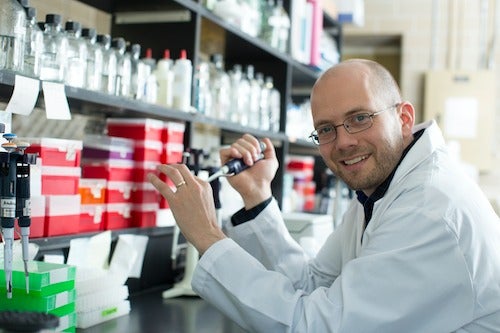
This article was originally published on the Faculty of Science website.
As we move towards a greener future, nuclear power is considered a viable energy alternative because it does not produce greenhouse gases. However, its use has created a new problem: how should we safely store radioactive waste?
Used nuclear fuel must be stored for approximately a million years, reducing radioactivity levels to those associated with naturally occurring uranium ore. A commonly proposed storage solution is to bury the waste for long-term safekeeping in underground sites known as deep geological repositories (DGRs), but more research needs to be done to finalize a safe and durable design.
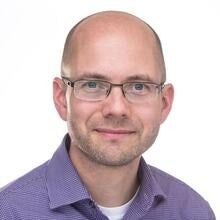
Professor Josh Neufeld and his laboratory are part of a multi-institutional collaboration to study microbial communities that inhabit subsurface rock and water at the proposed 500 metre repository depth, and those that might grow in the engineered barrier components that will surround the used fuel containers. This collaboration, which has just received new Alliance Grant funding from the Natural Sciences and Engineering Research Council of Canada (NSERC), also includes researchers from the University of Toronto and McMaster University, and their industry partner the Nuclear Waste Management Organization (NWMO).
The researchers in this collaboration will explore microbial communities and associated natural organic matter profiles from subsurface rock and groundwater samples, an important step in building a safety case for a potential repository site. Experiments using proposed barrier components of the repository, such as bentonite clay, will help determine the possibility of microbial growth and activity under the expected conditions. Naturally occurring rock and water samples from locations and sites with similar geology to the proposed repository will also be studied to better predict the long-term stability and activity of microorganisms. Of particular concern are microorganisms that produce sulfide which could corrode the used fuel containers, or gases which could create pathways for subsurface microbes and metabolites to access the fuel containers.
Professor Neufeld’s laboratory in the University of Waterloo's Department of Biology uses a variety of microbiology techniques, including cultivating microbes and DNA sequencing, to quantify and profile microorganisms in samples associated with this project. In particular, his research team is well equipped to handle environmental samples with very low numbers of microbes, which can approach the limits of detection. His laboratory has been involved in three prior research partnerships with the NWMO since 2016, including one project featuring graduate student Rachel Beaver that was highlighted recently.
“This NSERC Alliance Grant will enable a unique collaboration among several laboratories. We will use complementary techniques to shed light on the microbial communities associated with subsurface samples and engineered barrier components of a deep geological repository,” explains Professor Neufeld, who is responsible for the project’s overall direction.
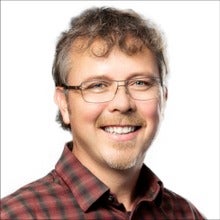
Professor Greg Slater of McMaster University has worked extensively over the past 20 years developing and applying new approaches to understand the fate and transport of organic compounds in environmental systems, including a focus on the characterization of microbial biomarkers, such as membrane lipids, from various environments. His laboratory will analyze lipid profiles for subsurface samples and experiments to complement the DNA-based and cultivation approaches used by the University of Waterloo.
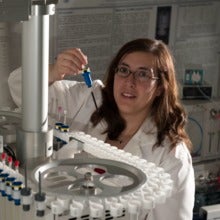
Professor Myrna Simpson, the Tier 1 Canada Research Chair in Integrative Molecular Biogeochemistry at the University of Toronto, is an expert on natural organic matter chemistry and reactivity in terrestrial and aquatic environments. Her laboratory explores how organic matter serves as a microbial growth substrate in various environments, using nuclear magnetic resonance and mass spectrometric techniques for her analytical work. For the NSERC Alliance research, the molecular-level organic matter data from Professor Simpson’s laboratory will provide unique metabolic insight into what the microorganisms in these samples are capable of consuming and producing as they grow.
“We are grateful for this timely opportunity to ensure that microbiology data will inform the NWMO as it identifies a suitable host site for a Canadian DGR and builds a safety case to ensure a stable repository," says Neufeld. "Specifically, our project will test various factors, such as temperature, salinity, and moisture, to ensure that specifications for a DGR will prevent microbial growth and activity over geological timeframes.”
The NSERC Alliance Grant is a five year grant with the purpose of encouraging university researchers to collaborate with partner organizations in order to accelerate the application of research results across Canada. The funding awarded to Neufeld and his collaborators has a total budget of approximately $2.8 million, and the University of Waterloo is the home institution for this project. Together, this team will work to characterize the impact of microbial activity on the proposed deep geological repository in order to contribute to the overall assessment of the safety of these repositories for permanent nuclear waste storage.
Remembering Michael Stones
A message from the Faculty of Health.

Michael Stones, who played a vital role in the growth of gerontology and research on aging at University of Waterloo and in Canada in general, passed away unexpectedly on April 22. Michael was known for seminal research on happiness, physical activity and aging and was a UWaterloo faculty member from 1994 to 1998.
His life was a reflection of his work. He was a Canadian champion race-walker and an avid fan of the Nottingham Forest football club. He is remembered as a kind, generous spirit who was always supportive and positive in his approach to his students and colleagues.
MFA thesis exhibition kicks off May 5 with Borrowers and Bullies
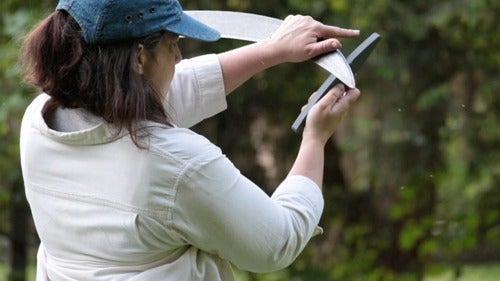
The Department of Fine Arts and the University of Waterloo Art Gallery will be showcasing the work of MFA thesis candidates Julie Hall and Jacob Irish, beginning on Thursday, May 5.
Borrowers and Bullies
"Central to this work is our understanding of a habit as not just a set of repeated behaviours but as a central, life-configuring scaffold for building and maintaining relationships to one another, the built environment, and the land," the artists write. "During the summer of 2021, we harvested materials, documentation, and experiences from settler-colonial greenspaces in Southern Ontario and The Maritimes, while asking ourselves: What was our social muscle memory in our home, our neighbourhood, our nation? And do these habits inform our ethics? We see our art practice as an opportunity to manifest anti-colonial and anti-capitalist ethics by tugging at relationships between subjectivity and materiality. Borrowers and Bullies is an exhibition with its eyes turned to the colonial-capitalist enclosure of time and land, and how that enclosure configures the knowable, the thinkable, and the imaginable."
Julie Hall and Jacob Irish
Julie and Jacob are a collaborating couple working in video, audio, and sculpture. They work seasonally: collecting materials in warm weather, and synthesizing their haul when winter comes. This methodology emerged from their first four years collaborating while at NSCAD University and continued through the next four years moving around Southern Ontario. They make sculptures that explore the materials that build our psychological, social, and economic realities. jacobirishjuliehall.com
"Please join us in celebrating the thesis work of our MFA candidates in-person," says a note from UWAG. An opening reception is scheduled for Thursday, May 5 from 5:00 p.m. to 8:00 p.m. in the University of Waterloo Art Gallery in East Campus Hall. "Visitors are required to show proof of vaccination and comply with campus safety guidelines."
The exhibition runs from May 5 to May 21.
Notes as a new term springs up
Monday, May 2 is the start of the spring term and the spring co-operative work term, with lectures and classes beginning today. Among the new beginnings for May:

Applications for Speak Like a Scholar are open today. "This six-week program is designed to help Master's and PhD students develop their professional scholarly voices and give effective academic presentations with confidence," says a note from the Writing and Communication Centre (WCC). Applications are due May 27.
Registration for English Conversation Circles is now open. "This six-week online program provides a safe space for English Language Learners (ELL) to practice conversational English with friendly staff and students," says a note from the Writing and Communication Centre (WCC). "ECC meets Tuesdays 1:00 p.m. to 2:00 p.m. and Wednesdays 3:00 p.m. to 4:00 p.m. from Monday, May 2."

And it's that time of year: registration will open on May 4 for the 30th annual Matthews Golf Classic.
The Matthews Golf Classic is a golf tournament held once a year in June. It is open to all staff, faculty, students, retirees, alumni, contractors and invited guests. The popular event started in honour of Burt Matthews, who served as President of the University of Waterloo from 1970 to 1981.
Scheduled for June 6, 2022, $95 will get you a round of golf, a cart, and a boxed lunch and dinner. $60 will get you the golf, the cart, and a boxed lunch.
For more information, contact Jim Howard.
Registration information is available on the Matthews Golf Classic website.

Warrior Rec FREE Fitness Week runs from Monday,May 2 to Friday, May 6. Test out what the Warrior Fitness membership has to offer, Yoga, Zumba, Barre and a variety of HIIT classes. Find out more. Warrior Rec Registration also begins today. Intramurals, instructional classes (Learn to Box, Learn to Skate and more) clubs, personal training and more are available. The intramural deadline is May 16 at 11:00 a.m., while the instructional deadline is May 12 at 11:50 p.m. Find out more. Registration is also open for Warriors Youth Climbing Lessons. Children ages 6 to 14 can join this 5-week climbing program running from May 28 to June 26. Find out more.
Today is also an important day for the University's Muslim community, who began celebrating Eid al-Fitr yesterday at sundown and will continue to do so for three days. Eid al-Fitr marks the end of the Muslim holy month Ramadan, and is marked with prayers, meals, gift exchanges, the wearing of new clothes, visits with friends and family, and respects paid at the graves of loved ones.
Additionally, Asian Heritage Month is held annually in May in Canada to celebrate and honour the experiences of Asian Canadians. Look out for Asian Heritage Month content on Waterloo News and in the Daily Bulletin this month.
Link of the day
Klaus Schulze, electronic music pioneer, dead at 74
When and Where to get support
Students can visit the Student Success Office online for supports including academic development, international student resources, immigration consulting, leadership development, exchange and study abroad, and opportunities to get involved.
Instructors looking for targeted support for developing online components for blended learning courses, transitioning remote to fully online courses, revising current online courses, and more please visit Agile Development | Centre for Extended Learning | University of Waterloo (uwaterloo.ca).
Instructors can visit the Keep Learning website to get support on adapting their teaching and learning plans for an online environment.
Course templates are available within your course in LEARN to help you build and edit your content and assignment pages quickly.
The following workshops, webinars, and events are offered by the KL team (CTE, CEL, ITMS, LIB):
- Independent Remote Course Design Essentials, self-directed, continuous self-enrollment course in LEARN.
- Independent Blended Course Design (iBlend), self-directed, ongoing
- Copyright Overview for Waterloo Instructors and Staff - self-directed, continuous self-enrollment course in LEARN.
Supports are available for employees returning to campus. Visit IST’s Hybrid Work and Technology guidelines and workplace protocols to assist with the transition.
The Writing and Communication Centre has virtual services and programs to help undergrads, grad students, postdocs and faculty members with academic writing.
- Meet with writing advisors in one-to-one appointments to brainstorm, draft, revise, and polish. No time for an appointment? Try email tutoring for undergrads.
- Beat isolation and make writing progress at weekly Virtual Writing Cafés for grad students and faculty or PJ-Friendly Writing Groups for Undergrads.
- Take an online workshop or apply to our popular Dissertation Boot Camp program.
- Faculty can request custom in-class workshops for their courses, or the WCC can facilitate any existing workshops for student groups.
- Course-integrated support available. Attention faculty and instructors: The application form for Writing and Communication Centre course-integrated support is now available online. We offer five unique support streams for your courses including synchronous and asynchronous workshops and monitored discussion boards.
Co-op students can get help finding a job and find supports to successfully work remotely, develop new skills, access wellness and career information, and contact a co-op or career advisor.
The Centre for Career Action (CCA) has services and programs to support undergrads, grad students, postdocs, alumni, and employees in figuring out what they value, what they’re good at, and how to access meaningful work, co-op, volunteer, or graduate/professional school opportunities. Questions about CCA's services? Live chat, call 519-888-4047, or stop by our front desk in the Tatham Centre 8:30 a.m. to 4:30 p.m., Monday to Friday.
Drop-in to Warrior Virtual Study Halls on Wednesdays from 5:30 p.m. to 7:00 p.m. Come together in this virtual space to set goals and work independently or in groups each week.
Renison's English Language Institute continues to offer virtual events and workshops to help students practice their English language skills.
If you feel overwhelmed or anxious and need to talk to somebody, please contact the University’s Campus Wellness services, either Health Services or Counselling Services. You can also contact the University's Centre for Mental Health Research and Treatment. Good2Talk is a post-secondary student helpline available to all students.
The Library is open with expanded hours for access to book stacks, drop-in individual study space, bookable group study rooms, drop-in access to computers and printers, book pick-up services and IST Help Desk support. Librarian consultations, Special Collections & Archives and the Geospatial Centre are available by appointment. Full details on current services and hours are available on the Library’s COVID-19 Update webpage.
The Faculty Association of the University of Waterloo (FAUW) continues to advocate for its members. Check out the FAUW blog for more information.
The University of Waterloo Staff Association (UWSA) continues to advocate for its members. Check out the UWSA blog for more information.
The Sexual Violence Prevention and Response Office (SVPRO) supports all members of the University of Waterloo campus community who have experienced, or been impacted, by sexual violence. This includes all students, staff, faculty and visitors on the main campus, the satellite campuses, and at the affiliated and federated Waterloo Institutes and Colleges. For support, email: svpro@uwaterloo.ca or visit the SVPRO website.
The Office of Indigenous Relations is a central hub that provides guidance, support, and resources to all Indigenous and non-Indigenous campus community members and oversees the University's Indigenization strategy.
The Waterloo Indigenous Student Centre, based at St. Paul’s University College, provides support and resources for Indigenous students, and educational outreach programs for the broader community, including lectures, and events.
WUSA supports for students:
Peer support - MATES, Glow Centre, RAISE, Women’s Centre - Visit https://wusa.ca/peersupport to book an appointment either in person or online for the Fall term.
Food Support Service food hampers are currently available from the Turnkey Desk 24/7 in the Student Life Centre. Drop off locations are also open again in SLC, DC, DP, SCH and all residences.
Co-op Connection all available online. Check https://wusa.ca for more details.
Centre for Academic Policy Support - CAPS is here to assist Waterloo undergraduates throughout their experience in navigating academic policy in the instances of filing petitions, grievances and appeals. Please contact them at caps@wusa.ca. More information is available.
WUSA Student Legal Protection Program - Seeking legal counsel can be intimidating, especially if it’s your first time facing a legal issue. The legal assistance helpline provides quick access to legal advice in any area of law, including criminal. Just call 1-833-202-4571.
Empower Me is a confidential mental health and wellness service that connects students with qualified counsellors 24/7. They can be reached at 1-833-628-5589.
GSA-UW supports for graduate students:
The Graduate Student Association (GSA-UW) supports students’ academic and social experience and promotes their well-being.
Advising and Support - The GSA advises graduate students experiencing challenges and can help with navigating university policies & filing a grievance, appeal, or petition.
Mental Health covered by the Health Plan - The GSA Health Plan now has an 80 per cent coverage rate (up to $800/year) for Mental Health Practitioners. Your plan includes coverage for psychologists, registered social workers, psychotherapists, and clinical counselors.
Dental Care - The GSA Dental Plan covers 60 to 70 per cent of your dental costs and by visiting dental professionals who are members of the Studentcare Networks, you can receive an additional 20 to 30 per cent coverage.
Student Legal Protection Program - Your GSA fees give you access to unlimited legal advice, accessible via a toll-free helpline: +1-833-202-4571. This advice covers topics including housing disputes, employment disputes, and disputes with an academic institution.
The Graduate House: Open Monday to Friday 11:30 a.m. to 6:00 p.m. We’re open to all students, faculty, staff, and community members. The Graduate House is a community space run by the GSA-UW. Vaccination Records and Government ID continue to be required for all dine-in guests. Graduate students who paid their fees can get discounts and free coffee.
When and Where (but mostly when)
Warriors vs. Laurier Blood Donation Battle. Join our “Waterloo Warriors” team on the Blood.ca website or app. #ItsInYouToGive
Master of Taxation, Virtual Information Sessions, full time info session Monday, May 2, 3:00 p.m., part-time info session, Monday, May 2, 4:00 p.m.
Spring term classes and lectures begin, Monday, May 2.
Co-operative work term begins, Monday, May 2.
NEW - Warrior Rec FREE Fitness Week, Monday,May 2 to Friday, May 6. Find out more.
NEW - Warrior Rec Registration, beginning Monday,May 2. Intramural deadline: May 16 at 11:00 a.m. Instructional deadline: May 12 at 11:50 p.m. Find out more.
NEW - Warriors Youth Climbing Lessons, registration opens Monday, May 2. Children ages 6-14 can join this 5 week climbing program starting May 28 to June 26. Find out more.
Armchair Chat with The Right Honourable David Johnston, Monday, May 9, 1:00 p.m. to 2:00 p.m. (armchair chat), 2:00 p.m. to 2:30 p.m. (book signing), School of Optometry and Vision Science, Room 1129.
PhD oral defences
The following is a selection of recent and upcoming thesis defences:
Statistics and Actuarial Science. Fangya Mao, "Design and Analysis of Life History Studies Involving Incomplete Data." Supervisor, Richard Cook. Thesis available from MGO - mgo@uwaterloo.ca. Oral defence Monday, April 11.
Environment, Resources and Sustainability. Kiri Staples, “Addressing cumulative effects in the context of sustainability and co-governance in Tr'ondëk Hwëch'in traditional territory, Yukon”. Supervisor, Robert Gibson. Available upon request from the Faculty of Environment, Administrator, Graduate Studies. Oral defence Monday, May 2, 1:00 p.m.
Religious Studies. Chris Miller, "Out of the ‘Broom Closet’ and Into the Academy: The Development of Contemporary Pagan Studies and the Role of Scholarship in Shaping Legitimacy." Supervisor, Doug Cowan. Available upon request from the Faculty of Arts, Graduate Studies and Research Officer. Oral defence Thursday, May 5, 1:00 p.m.
Geography and Environmental Management. Faiza Omar, “Exploring the Tourism Development Trajectory in a Post-colonial Region Through the Lens of Evolutionary Economic Geography: The Case of Central Region of Ghana”. Supervisor, Clare Mitchell. Available upon request from the Faculty of Environment, Administrator, Graduate Studies. Oral defence Friday, May 13, 1:00 p.m.
Geography and Environmental Management. Esra Alkim Karaagac, “In Debt to the State: Lived Experiences of Indebtedness in State-led Housing Projects in Istanbul”. Supervisor, Nancy Worth. Available upon request from the Faculty of Environment, Administrator, Graduate Studies. Oral defence Tuesday, May 17,09:30 a.m.